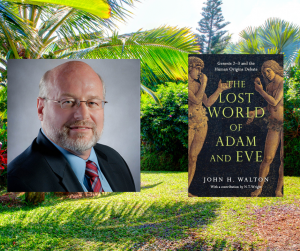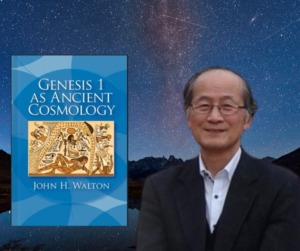The film Is Genesis History? has gained a lot of attention from Christians and Non-Christians alike. Young Earth Creationists loved it, Non-Christians ridiculed it, and Old Earth and Evolutionary Creationists were dismayed by more scientific nonsense being pedaled by the young earth crowd all in the name of upholding the trustworthiness of scripture when The Bible does not require a young earth. Love it or hate it, buy it or bash it, Is Genesis History? got a lot of publicity.
As I recently found it, the website for this movie has a blog section, and one blog post, written by the director of the film himself, Thomas Purifoy Jr, wrote a lengthy article criticizing The Cosmic Temple Inauguration view (CTI) of Genesis One which I wrote about in my blog post “The Cosmic Temple Inauguration Of Genesis 1”, and in my two responses to William Lane Craig’s critiques of it (see here and here) and Hugh Ross’ critique of it (click here). To avoid reinventing the wheel, I’m going to assume that readers of this article will already have at least some basic familiarity with this view, and I will write with that presupposition in mind. In other words, I’m writing to a high context audience, not a low context audience, so if you haven’t looked into the CTI at all, you may get lost along the way. Thomas Purifoy Jr’s article is called “The Gnostic World Of John Walton”. In this blog post, I will respond to Purifoy’s article point by point.
The Usefulness of a Lost World
After briefly describing Walton’s view as laid out in The Lost World Of Genesis One, Purifoy goes on to notice that many Theistic Evolutionists have latched onto the CTI because it perfectly harmonizes the creation account in Genesis with the scientific consensus of life developing through an evolutionary process over billions of years. We recognize that, as Walton said “If the Bible does not offer an account of material origins, we are free to consider contemporary origins on their own merits, as long as God is seen as ultimately responsible.”1
Granted, this interpretation does allow the Christian to follow the scientific evidence wherever it leads, but the author seems to be insinuating that Walton, myself, Michael Jones of Inspiring Philosophy, and many other Evolutionary Creationists are motivated to adopt this interpretation because, if it’s false, then we either have to say The Bible is wrong or reject evolution. In other words, if it weren’t for secular science, no one would be inclined to adopt the CTI view of Genesis 1. This may not be Purifoy’s point, but if it isn’t, I can’t see why he would mention that many Theistic Evolutionists have adopted it and found it useful, that John Walton is a BioLogos contributor, and that “In 2013, Biologos funded a seven month world tour for Dr. Walton to speak in dozens of seminaries and universities in the United States and 15 other countries.” What is the point in bringing things up if not to subtly imply that people only adopt CTI because of scientific motivations rather than exegetical motivations?
I would argue that while we might not consider the CTI interpretation if not for modern science (or recently excavated Ancient Near Eastern creation myths), that isn’t the reason for its acceptance. From my own personal convictions, even if I were convinced that evolution was a total failure as a scientific theory, even if I were a hardcore special creationist, I would still hold to this view of Genesis. Why? Because of the biblical evidence, the ANE context, and usage of the Hebrew vocabulary all point in that direction. Indeed, I was heavily leaning towards the CTI interpretation long before I affirmed the scientific theory of evolution as a fact. Granted, I was an Old Earth Creationist (billions of years but no evolution), but I didn’t need The Cosmic Temple Inauguration view even as an OEC. There were other options for me available such as The Day-Age view which I held for many years. There’s also The Framework Hypothesis. In fact, I know some Theistic Evolutionists who hold to the Day-Age view and The Framework Hypothesis. So, even as a Theistic Evolutionist, I could jettison The Cosmic Temple Inauguration view in favor of something else. I could not accept The Calendar Day interpretation2 of Genesis 1 and be an OEC or TE, but the Calendar Interpretation of Genesis 1 is really the only view that precludes an old-earth scenario.
I accept The Cosmic Temple Inauguration interpretation of Genesis 1 and the Archetypal interpretation of Adam and Eve’s formation because I think the evidence, both within the Bible and from The Bible’s contemporary literature, strongly support these views. See my blog post “The Cosmic Temple Inauguration Of Genesis 1”,
Entering A Gnostic World
Purifoy compares John Walton to Origen and said that Origin had one of the most creative theological minds in church history, but unfortunately his creative thinking lead Origen into some heretical thinking. I’m not going to disagree on that point, but is it really fair to compare John Walton with Origen? Why would Purifoy say such a thing? The reason is because of some of the statements Walton made in a paper.
Purifoy listed several statements of Walton, all of which were taken out of context, and said that these statements reveal a modern form of Gnosticism. Rather than point out the context and meaning of each statement, I’ll simply admonish the reader of this blog post to be a good Berean and read John Walton’s Lost World series for themselves. I do this for the sake of brevity.
I will instead move on to address the rest of the article. Purifoy wrote “By ‘Gnosticism,’ I’m referring to a philosophical view of the world that thinks special, hidden knowledge is necessary to understand what is true. For Dr. Walton, this knowledge is found in his ‘lost world’; it can only be recovered by scholars like himself. Such knowledge provides true insight into reality.
Reality is thus split into two levels: what seems to be real versus “a deep reality that transcends events and history.” Those who do not accept Dr. Walton’s knowledge as he presents it are dismissed as lacking true understanding: they are misdirected, they use improper categories, they ask the wrong questions.
When one accepts his knowledge, however, it reveals divisions between categories previously assumed to be connected: faith and reality, function and material nature, language and event, theology and history.
Misunderstandings about these things have persisted for centuries in the church due to lack of knowledge. Now that this special knowledge is available, the church can begin to know the truth. …….As one accepts this knowledge, one is able to move past tensions assumed to exist between competing views of origins and history. Instead, when one realizes the Biblical text is describing ‘theological history’ rather than actual history, one is free to accept evolution as the true history of the universe.”
Why is it Gnosticism to say that you can’t really get a good handle on some biblical passages unless you study the original Hebrew and the cultural context? Isn’t that just responsible scholarship? If you’re going to read a text that’s thousands of years old and that comes from another country, you had better understand the literature of that time period and area so you know how they thought and don’t impose your own cultural presuppositions onto the text. What if someone told Purifoy “You know, you could get a better handle on what The U.S Constitution says if you go to the federalist papers and read writings by people like John Locke.” (No, not the bald guy from Lost). Would Purifoy consider that Gnosticism? No, because that would be ridiculous. Of course, you’re going to look at contemporary literature to get into the Founders’ cognitive environment. This is how you’ll discern whether the second amendment was meant for the purpose of hunting or the purpose of guarding against tyranny.
By the way, I don’t think you need the scholarly depth Walton goes into in his writings to get the primary core points God intends to get across. When anyone reads Genesis 1, there are some things that simply cannot be missed such as that God is sovereign over all creation, that God is responsible for creating everything that exists, that human beings were made in His image with the intention of being in a personal relationship with Him, etc. Anyone with a brain and the ability to read can get these points from a casual reading of Genesis. However, to get a proper interpretation of the peripherals (i.e is this about material creation or functional creation? Is this an inauguration of a temple? Are the days 24 hours or long time periods?) one is going to need to do their homework. As St. Jerome said “The Scriptures are shallow enough for a babe to come and drink without fear of drowning and deep enough for theologians to swim in without ever touching the bottom”3
Theological History VS. Biblical History?
Just what is meant by “theological history”? Does it mean mythology? Allegory? Let’s allow John Walton to speak for himself: “First, the genre of Genesis is theological history …The narrative speaks of events that actually happened in space and time. All history is selective and interpreted according to the intention of the author as the author communicates with the audience. The focus of the author of Genesis is theological in that he is interested in describing God and his relationship with his human creatures.” (emphasis mine)4 This quote is from The Lost World Of The Flood. What Walton (and Longman) are saying is that the author of Genesis isn’t simply interested in writing a play-by-play of what happened in space and time. They are, but they are interested in far more than that. They are interested in the events because of how they interpret those events theologically. With the Nochaic flood, for example, Moses wasn’t just interested in saying “The whole world was flooded, but one man and is family were saved because they built a boat and got on it”. It was the theological significance of the actual event that interested Moses and was thus the reason why he included it in the book of Genesis. The theological significance being that God is just and punished the wicked as they deserved, He was merciful because he let it go on for a long time prior to unleashing judgment, he got rid of the Nephilim which were attempts of the sons of God to pollute the Messiah’s bloodline, and so on and so forth. As Walton and Longman go on to point out in their book is that other cultures interpreted this exact same event in light of their own theologies and religions.
The point here is that the only difference between “History” and “Theological History” in Walton and Longman’s eyes, is that the former is simply reported and the latter is interpreted for us. The former says “Here’s what happened.” The latter says “Here’s why it happened”. To use Jesus as an example, Josephus and Tacitus’ report of Jesus’ crucifixion would fall into the former (“Jesus was crucified”), while the 4 gospels and the epistles would fall into the latter (“Jesus was crucified to atone for the sins of the world.”). Both are history in that both are reporting real events that actually happened, but only the latter tells us the theological significance of the event.
Purifoy wrote “According to Dr. Walton, Biblical truth is not dependent on real history.“
In Walton’s book The Lost World Of Adam and Eve: Genesis 2-3 and The Human Origins Debate, regarding the Apostle Paul’s treatment of Adam and Eve in his epistles (i.e Romans 5, 1 Corinthians 15:47, 2 Corinthians 11:3, 1 Timothy 2:14), John Walton writes that “…some might claim Paul is simply referring to well-known literary details and that doing so does not necessitate that the details be affirmed as historically factual. They would distinguish between literary factuality (yes, this is how the familiar story goes) and that which is historically factual (yes, this is what really happened in time and space). This is the path typically followed in the interpretation of Jude 14: ‘Enoch, the seventh from Adam, prophesied about them.’ Even very conservative interpreters consider this a reflection of a literary truth, not a historical truth. None of them seriously considers the Enoch from the book of Genesis to be the author of the intertestamental book of Enoch. We still have to deal with taking a hermeneutically realistic view of what the author is doing with the material he cites. The argument of the author of Hebrews would not work if Abram did not give a tithe to Melchizedek. In the same way, I would contend that Paul’s argument would not work if there was not a historical moment when sin entered the world. …His whole approach to the presence of sin, the need for redemption and the role of Christ to bring such redemption is based on these details.“5 (emphasis mine)
As you can see, Thomas Purifoy Jr. severely misrepresents John Walton’s position when it comes to The Bible and historical factuality. Purifoy has committed a logical fallacy known as The Straw Man Fallacy.
It’s Not About What God Could Or Could Not Do
Purifoy wrote “In the first centuries, Gnosticism said truth was found in knowing that God could not have entered time as a sweating, laughing, bleeding man. In these latter centuries, Gnosticism says truth is found in knowing God could not have created dirt, water, and life in a few days, or formed two people immediately from dust and a rib, or destroyed the earth with a global flood during the 600th year of Noah’s life.” — But John Walton, Inspiring Philosophy, Tremper Longman III, nor myself doubt that God could materially manufacture everything in a few days or create a man from dirt. The question is “What does The Bible say God did?” The question is not what God can or cannot do, but what God actually did as reported in The Bible. Does The Bible claim that God physically brought everything into material existence over 6 24-hour days? Or is Genesis saying that God assigned functions and roles to everything in 6-24 hour days for the sake of His human creatures, and that the creation of functions is part of an inauguration period of a temple, God’s temple; the universe? Based on the biblical evidence and evaluation of the Hebrew words and ANE context, Walton and I would say that the latter is the case. See my blog post “The Cosmic Temple Inauguration Of Genesis 1”,
Does The Bible claim that God scooped up a pile of dirt, tossed it into the air and *poof* there’s Adam! Or does The Bible use the dust language in Adam’s formation to denote an attribute common to humanity (i.e mortality)?
Ironically, given the definition of theological history that Walton actually uses (not the straw man that Purifoy employs) the passages he cited several paragraphs later in the article are an example of theological history. \“After the first Passover, Moses told the people to ‘Remember this day in which you came out from Egypt, out of the house of slavery, for by a strong hand the Lord brought you out from this place…You shall tell your son on that day, ‘It is because of what the Lord did for me when I came out of Egypt.’’ (Ex. 13:3,8) And later, as they journeyed toward Canaan, “Moses wrote down their starting places, stage by stage, by command of the Lord…” (Num 33:2)” \— The Exodus actually occurred, the plagues actually occurred, the Israelites were really in bondage, but Moses puts the theology in the history.
I was just reading Walton’s Ancient Near Eastern Thought and The Old Testament earlier today and I read his chapter on historiography. Walton’s thoughts, in a nutshell, are that there’s a contrast between our modern culture and the ancient culture when it comes to recording history. Our modern culture is interested in chronicling events just for the sheer sake of chronicling events. The ancients, however, were interested in chronicling events because they could learn something from their history, or because it revealed something the gods were doing (the theological perspective of what happened – theological history). Purifoy seriously needs to read Walton’s books and either delete his article or seriously amend it. He distorts Walton’s arguments and beliefs beyond recognition.
Walton does not deny that The Bible records history; actual events that occurred in the past. He would agree with Dr. Nicholas Perrin, a professor of Biblical Studies at Wheaton who Thomas Purifoy Jr. quoted in the article,
“God made history and history matters. Apart from the conviction that our faith is a historical faith, we are left only to cast about. But, when we are fully persuaded that sacred history meshes with the history in which we live and move and have our being, that is when biblical faith becomes a real possibility…. The heart-and-mind value of reconnecting the biblical world with the ‘real world’ can hardly be overstated. Somehow in our confused modern-day thinking, we have managed to put asunder what God has joined together.”6
John Walton would agree with that. Tremper Longman III would agree with that. Michael Jones of Inspiring Philosophy would agree with that. I would agree with that. Every orthodox Christian would agree with this quote whether they accept or reject the interpretations in The Lost World series.
What’s especially ironic is that Thomas Purifoy Jr. unwittingly argues for exactly what Walton and Longman label “Theological History” when he says “God’s discussion with Abraham in Genesis 18 is an example of this. God and the angels spent many hours with Abraham waiting for a meal to be cooked then eating it together. They would naturally have talked about numerous things. Yet only two are included in the historical narrative: the promise concerning Isaac and the interchange about destroying Sodom and Gomorrah. Under the guidance of the Holy Spirit, therefore, prophets writing about the past were led to select certain events, ignore others, emphasize specific actions, and even adjust chronological order to highlight particular points.”7
Layer Cake
Walton’s layer cake analogy was simply to show a way of understanding divine causation. This isn’t a part of his interpretation of Genesis 1, but Purifoy even misrepresents this portion of Walton’s work. Walton said that when we think of events in the world, we tend to divide them up into a pie chart in our minds. If something can be explained naturally, it goes into the “Natural Explanation” side of the chart. If something is scientifically inexplicable, it goes into the “Supernatural Explanation” side of the chart. Moreover, if it’s in the “Natural Explanation” category, God did not do it, nature did. If it’s in the “Supernatural Explanation” side, nature didn’t do it, God did. This is why macro evolution is so often thought to leave God no role in creation. If natural processes were responsible for the diversity of life, then God is not responsible.
Walton said that this mode of thinking is unbiblical, and “we need to change deserts”. He said we need to think of events in terms of a layer cake. Whether an event is miraculous or naturally explicable, God is still behind it. The top layer is God’s activity, and the bottom layer contains all that happens in the world, natural and supernatural. God is just as at work in processes that are naturally explicable as he is in events that science cannot explain. God is just as much to praise for someone finding you injured on the side of the road and driving you to the hospital as he would be if he instantaneously healed you. I find that Young Earth Creationists like Purifoy have a very low view of divine providence. Or at least they’re inconsistent. It’s inconsistent if you think God can heal through doctors but God cannot create through evolution. God can work through natural processes just as He works through miraculous, scientifically inexplicable acts.
Walton isn’t trying to separate God’s actions from the real world as Purifoy accuses, He’s simply saying that natural processes and divine action aren’t mutually exclusive.
Conclusion
The vast majority of this article belabored a point that Walton nor those who agree with his view of Genesis (e.g me) would disagree with; The Bible records actual historical events. I kept reading the article hoping to find a rebuttal to something Walton actually said, but alas, I could not. I just kept seeing the same poor straw man experience blow after blow after blow, meanwhile, Walton’s real arguments stood in the background untouched. None of the arguments in The Lost World Of Genesis 1, Adam and Eve, or The Flood were even interacted with.
For such a lengthy article, all I read was an accusation that Walton was promoting Gnosticism because he told us we need to look at the original Hebrew and the Ancient Near Eastern background of The Old Testament to get a handle on what the text is saying (*gasp* The Heretic)! and that Walton denies that The Old Testament records historical events which is a straw man argument. This is probably the worst response to Walton I’ve read thus far.
——————————————————————
NOTES
1: John H. Walton, The Lost World of Genesis One (IVP Academic, 2009) 131.
2: The Calendar Day View says that God materially brought everything into existence over 7 24-hour periods. This creation week took place 6,000-10,000 years ago.
3: https://www.goodreads.com/quotes/940101-the-scriptures-are-shallow-enough-for-a-babe-to-come
4: Walton, John H.. Longman III, Tremper. The Lost World of the Flood: Mythology, Theology, and the Deluge Debate (p. 90-91). InterVarsity Press. Kindle Edition.
5: Walton, John H.. The Lost World of Adam and Eve: Genesis 2-3 and the Human Origins Debate (p. 100-101). InterVarsity Press. Kindle Edition.
6: Andrew E. Steinmann, From Abraham to Paul: A Biblical Chronology (Concordia Publishing House, 2011) xxiv.





